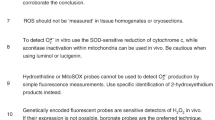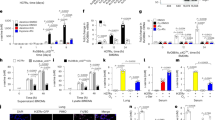Abstract
AN earlier investigation1 revealed that during citrate dissimilation by non-proliferating suspensions of Klebsiella aerogenes, diphtheria toxin caused increased accumulation of pyruvic and α-ketoglutaric acid. This observation suggested that diphtheria toxin acts by diminishing the utilization of keto-acids in tissues. It was, therefore, decided to investigate the effect of diphtheria toxin on the keto-acid content of blood and tissues in guinea-pigs.
This is a preview of subscription content, access via your institution
Access options
Subscribe to this journal
Receive 51 print issues and online access
$199.00 per year
only $3.90 per issue
Buy this article
- Purchase on Springer Link
- Instant access to full article PDF
Prices may be subject to local taxes which are calculated during checkout
Similar content being viewed by others
References
Agarwal, S. C., J. Path. Bact., 87 (1), 186 (1964).
Friedemann, T. E., and Haugen Gladys, E., J. Biol. Chem., 147, 415 (1948).
Agarwal, S. C., J. Path. Bact., 79 (2), 313 (1960).
Author information
Authors and Affiliations
Rights and permissions
About this article
Cite this article
AGARWAL, S. Accumulation of Keto-acids in Tissues during Diphtheria Intoxication. Nature 208, 914–915 (1965). https://doi.org/10.1038/208914a0
Issue Date:
DOI: https://doi.org/10.1038/208914a0
This article is cited by
Comments
By submitting a comment you agree to abide by our Terms and Community Guidelines. If you find something abusive or that does not comply with our terms or guidelines please flag it as inappropriate.



